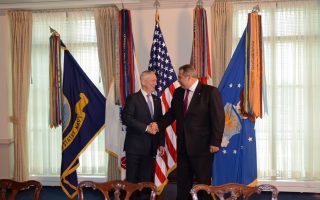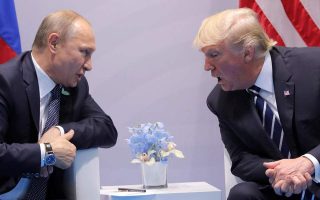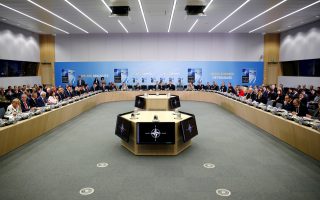The US-EU crisis, NATO and Greece

The Euro-Atlantic family is going through one of the worst crises in its history, as its unity is being challenged, mainly by its most powerful member. The parents in the Western family – the US and Europe – are locked in a confrontation that until a short while ago seemed unthinkable, leaving their creation, NATO itself, in the grips of – one could argue – existential angst.
As NATO’s foreign ministers prepare to meet in Washington on April 4 to mark its 70th anniversary, the leader of the main pillar of this alliance, whose supporters and critics both agree is effective, is openly expressing disdain for his country’s key partner, the European Union.
This writer was at the Washington summit in April 1999, when NATO’s leaders celebrated the 50th anniversary of the most powerful alliance in the history of the world. There were differences then too, but you clearly felt the positive spirit. At this year’s gathering, though, the atmosphere promises to be very different, even if efforts will be made to keep up appearances.
Sure, there is plenty to criticize about specific NATO decisions and actions, from Greece’s point of view as well. Nevertheless, without the alliance – and despite its often controversial stance on particularly sensitive issues for us – our country would face an extremely difficult environment.
The differences separating the Americans and the Europeans were more than apparent during the Munich Security Conference earlier this month, proving that the crisis is not only very real but the rift is deepening. No one can say whether it will end in a separation, but the mood is definitely souring. In the meantime, all the members of the family, including Greece, face some serious dilemmas.
Donald Trump’s America – even more so if the US president is re-elected for another term – appears determined to break with the collective model and focus on bilateral relationships in trade and defense. People in the White House today see NATO not as a necessary and useful security tool, but as an “unnecessary cost” with negligible benefits for the US. I witnessed this myself in a private conversation I happened to be a part of in Washington yesterday; the arguments were quite shocking.
The only real safety valve now is Congress, where international relations experts on both sides of the aisle are already ringing the alarm bells.
Meanwhile, though, the situation remains unpredictable, and for a country like Greece, whose actions are constrained by its relatively small size, the threat of divorce is extremely worrisome.





